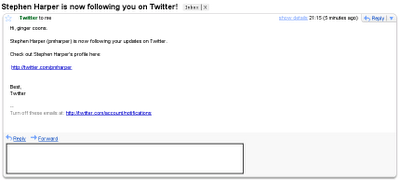 This has to be the most fun email I've gotten in a while. While it's also edifying that I'm among the hundreds of people being followed by the Liberals, NDP, and Greens, it just kind of tickles me to see these words pop up in my email. Gee golly! Now the Prime Minister will know what I'm eating, how my plants are doing, and when I have a new blog post up. Twitter really is a fantastic way for politicians to pretend to listen.
This has to be the most fun email I've gotten in a while. While it's also edifying that I'm among the hundreds of people being followed by the Liberals, NDP, and Greens, it just kind of tickles me to see these words pop up in my email. Gee golly! Now the Prime Minister will know what I'm eating, how my plants are doing, and when I have a new blog post up. Twitter really is a fantastic way for politicians to pretend to listen.
September 2008 Archives
 This has to be the most fun email I've gotten in a while. While it's also edifying that I'm among the hundreds of people being followed by the Liberals, NDP, and Greens, it just kind of tickles me to see these words pop up in my email. Gee golly! Now the Prime Minister will know what I'm eating, how my plants are doing, and when I have a new blog post up. Twitter really is a fantastic way for politicians to pretend to listen.
This has to be the most fun email I've gotten in a while. While it's also edifying that I'm among the hundreds of people being followed by the Liberals, NDP, and Greens, it just kind of tickles me to see these words pop up in my email. Gee golly! Now the Prime Minister will know what I'm eating, how my plants are doing, and when I have a new blog post up. Twitter really is a fantastic way for politicians to pretend to listen.
I really shouldn't be allowed to go to restaurants where they serve cream in little individual containers. Why? I like corbelling too much. This is what happens when it gets extreme.
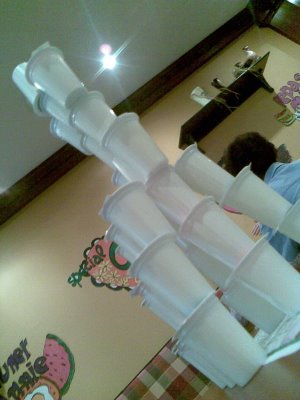

I had an idea, coming up to a month ago, that i absolutely need to do. While I was moving and had a front room full of boxes, I got to thinking about what people would see if they were to glance at my window. Wouldn't it be awesome, I thought, if I had blinds that had a great big picture of a beautiful, well decorated room printed on them? So that's the idea: a venetian blind with a large photo of a nice looking room printed on the outside. That way, any curious window glancer would see, instead of what's actually in your house (or a normal, boring pair of curtains), a room good enough to be in a decor magazine. Awesome? Of course.
I'm kind of addicted to "Kubla Khan." It's a fantastic, profoundly strange and beautiful poem. It's also in the public domain, which lets me do nice things to it without infringing copyright. I've done an illustrated zine version in the past, I think I'm working on another. Just finished, though, is a very strange web based version.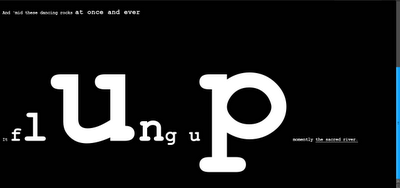
It's kind of concrete poetry on the internet. Find it here.

It's kind of concrete poetry on the internet. Find it here.
Below is my little lay-introduction to the Internet as the ultimate copy machine. It's altogether too easy to forget that this is an instrument built for copying.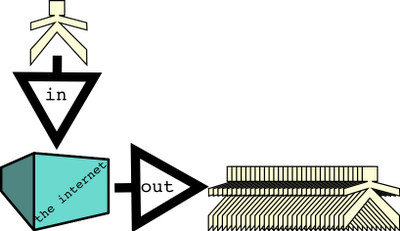
Computers are copying machines. They do the job of duplicating even better than photocopiers. The Internet is the hyperactive child of computation in most respects, but especially when it comes to copying. Everything you so much as look at when browsing the Web (No, I'm not using “Internet” and “Web” interchangeably. Right now, I mean WWW.) gets copied onto your own personal hard drive. Let's say that again, shall we: Everything. That's the automatic aspect of copying on the Internet, as practised by our good friends Firefox and Opera (or their mean brother, IE).
Copying on the Internet isn't just automatic. There's also a social aspect to the copying. When you take digitized media, which is what populates the Internet, and put it in the same place as people, copying will inevitably happen. Say I put a photo on my website. You take a look a look at my website (That's what I want you to do, after all. Why else would I put it on a public website if I didn't want you to look at it?). First, your browser, which doesn't have much taste or discrimination, grabs everything my website has to offer and makes a little copy for itself. Then, quite independently, you decide that you like the photo. You like it so much that you download it. Maybe you use it as a background, or even print it out and hang it on your wall. It's perfectly natural. I make my photo available, you see and like. All you have to do to get your own copy is click your right mouse button (or CTRL click, if you happen to be a Mac person). It doesn't feel like work, and I still have my copy of the photo. In fact, my copy and your copy are exactly the same. And the copy that every browser makes for itself when someone looks at my website is exactly the same as our copies. (It doesn't feel like stealing, since you haven't taken anything from me. In fact, it isn't even copyright infringement, since you've only used it for personal study and can claim Fair Dealing. But you don't know that. You just liked the photo and wanted to look at it without coming back to my website every day.) In such a way, the Internet can be seen as a giant (mostly apolitical and amoral) copying machine.

Computers are copying machines. They do the job of duplicating even better than photocopiers. The Internet is the hyperactive child of computation in most respects, but especially when it comes to copying. Everything you so much as look at when browsing the Web (No, I'm not using “Internet” and “Web” interchangeably. Right now, I mean WWW.) gets copied onto your own personal hard drive. Let's say that again, shall we: Everything. That's the automatic aspect of copying on the Internet, as practised by our good friends Firefox and Opera (or their mean brother, IE).
Copying on the Internet isn't just automatic. There's also a social aspect to the copying. When you take digitized media, which is what populates the Internet, and put it in the same place as people, copying will inevitably happen. Say I put a photo on my website. You take a look a look at my website (That's what I want you to do, after all. Why else would I put it on a public website if I didn't want you to look at it?). First, your browser, which doesn't have much taste or discrimination, grabs everything my website has to offer and makes a little copy for itself. Then, quite independently, you decide that you like the photo. You like it so much that you download it. Maybe you use it as a background, or even print it out and hang it on your wall. It's perfectly natural. I make my photo available, you see and like. All you have to do to get your own copy is click your right mouse button (or CTRL click, if you happen to be a Mac person). It doesn't feel like work, and I still have my copy of the photo. In fact, my copy and your copy are exactly the same. And the copy that every browser makes for itself when someone looks at my website is exactly the same as our copies. (It doesn't feel like stealing, since you haven't taken anything from me. In fact, it isn't even copyright infringement, since you've only used it for personal study and can claim Fair Dealing. But you don't know that. You just liked the photo and wanted to look at it without coming back to my website every day.) In such a way, the Internet can be seen as a giant (mostly apolitical and amoral) copying machine.
People, if you think about it, are a fair bit like corporations. We all have shareholders, people who have an interest in how things turn out. Generally, we're each the majority shareholder in our own life. We accomplish things (and sometimes don't accomplish things we'd like), and set both long and short term goals. To this end, I've been working on my own annual report. Aside from the lack of financial information, it bears a pretty good resemblance to a normal annual report. Of course, mine may pay a little more attention to style than some corporate annual reports.
For your edification and amusement, I present to you the cover of my 2008 annual report:
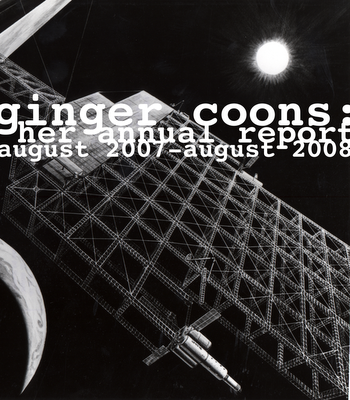
For your edification and amusement, I present to you the cover of my 2008 annual report:
